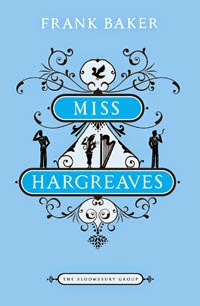This is a post I've been meaning to write for a while, because I always think it's fascinating to find out how people's reading personalities arrived at their present status. That's one of the reasons I've loved doing
My Life in Books on Stuck-in-a-Book, because it takes a look behind the blogs and sees the histories of the readers.
Well, one of the biggest influences in my reading life is A.A. Milne, who remains one of my favourite writers - and whom I discovered when I was about 16 or 17, and was the first adult author whom I really loved, reading more than twenty of his books in a year or two. Yes, there is an irony that he takes this role when he is best known for his children's books but, as I will go on to describe, in many ways he was the ideal author to take me from loving reading to being a truly committed bibliophile.
On the one hand, he was ideal simply because he is good. There's always a danger that the books we love when developing our taste turn out to lose their shine as we explore the literary world more, and that's been my experience with a few books - but not with AAM. Everything from his early sketches to his autobiography still makes me laugh, think, or nod - the only exceptions being those few books I didn't love much the first time around (such as
Chloe Marr) and even some of these (
Two People) have improved on re-visiting, rather than the reverse. I know I can rely on Milne - I've just finished a re-read of
Not That It Matters (1919; reviewed
a couple of years ago) and a few weeks ago read his short play
The Artist: A Duologue (1923). Just as lovely and light and fun as ever.
But it is not that alone which made him such a perfect introduction to the world of book-reading, book-hunting, and book-loving. First off, he was astonishingly varied. In loving one author, I could explore books as varied as silly house-party cricketing golfers in
The Day's Play etc., witty plays (
The Dover Road), thoughtful plays (
The Great Broxopp), hilarious novels (
Mr. Pim Passes By), moving novels (
Two People), a great work of pacifism (
Peace With Honour), short stories (
The Birthday Party), essays (
By Way of Introduction), poetry (
Behind the Lines), and autobiography - and children's books, of course. His range - particularly in form, but also in tone - is practically unbeaten in the 20th century, simply because there aren't all that many spheres left unwritten.
So, that accounts for the writing. But I don't think I'd have become quite the bibliophile I am today if Milne's work were either much better known or much less known. The fact that I stumbled upon it at all was due to my school library having Christopher Milne's
The Enchanted Places, and my aunt Jacq being a fan of his and lending me books (for which I am ever grateful). There can't be all
that many authors for whom there exists an autobiography, a family memoir (
The Enchanted Places), and a brilliant biography (Ann Thwaite's
A.A. Milne: His Life). There's even a critical analysis of his work - Thomas Burnett Swann's
A.A. Milne (1971), which I managed to track down and read this year, after a decade of hunting. And I gloriously disagreed with him for much of it (he hates Milne's hilarious early stuff, and at one point seems to be quite genuinely shocked, and not at all ironic, when he notes that young people 'preferred the irrelevancies of a
Punch essayist to the nobilities of Lord Tennyson'; elsewhere he is more willing to commend, but he still has a curious dislike for much of Milne's work which makes writing his book a curious choice. Still, I loved finding someone else who had read everything Milne wrote.)
And that's the other thing - and perhaps the most important element in making me the bibliophile I've become - is that Milne
isn't better known. If I'd been able to buy all his books in Waterstone's, or for £1 a pop on Amazon, then I wouldn't have caught the book-hunting bug. A lot of Milne's work can be tracked down easily, but a lot of it can't - and especially couldn't in 2003-4. A decade earlier, it would have been impossible. A decade later, it would have been easier - but as it was, I bought some things online, and learned the joy of hunting through secondhand bookshops the rest of the time. Little did I know what a coup it was when I found
Before The Flood for 75p in one of my first secondhand bookshops! By the time I stumbled across
For The Luncheon Interval, I knew how lucky I was to find it.
And the search is not yet over, even ten years and more later. I've managed to find things as obscure as his pamphlet on humanism and
War Aims Unlimited, but the collection of stories, limited to 600 copies of which he signed every single one? The chances of me finding an affordable copy are slim - but it's that sort of thing which keeps the joyous hunt alive. You don't get
that buying the complete works of Shakespeare in one fell swoop.
So, AAM has stood me in good stead. I wrote this post as a repository for many A Century of Books titles, but it's also a celebration of an author who made me a besotted reader and an equally besotted book-hunter (and, yes, book-buyer). And now, of course, I'd love to know which author or authors takes this role for you?




















.JPG)


